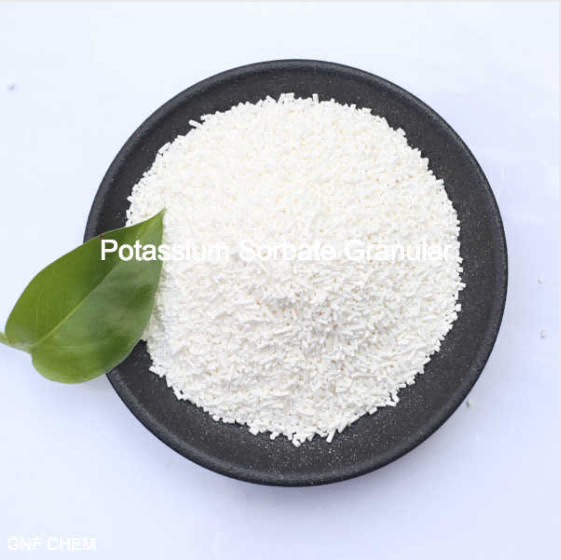-
Make a Call : +86 551 63500087
-
Get A Estimate : sales@gnfchem.com
What Are You Looking For?
What Are You Looking For?
Make a Call : +86 551 63500087
Get A Estimate : sales@gnfchem.com

What metabolic process does potassium sorbate undergo in the human body?
Sep 30, 2025The metabolic process of potassium sorbate in the human body is safe and thorough, following the overall path of "absorption → liver metabolism → decomposition into harmless products → excretion", and it has no accumulative property. Specifically, it can be divided into the following key stages:
1. Absorption after oral intake: rapid and complete
As a water-soluble potassium salt, potassium sorbate will rapidly dissociate into sorbic acid ions and potassium ions in the gastrointestinal tract after oral intake:
Potassium ions: As an essential electrolyte for the human body, they are directly absorbed by the intestines and participate in the normal potassium balance regulation in the body (such as maintaining cell osmotic pressure, neuromuscular excitability, etc.). The excess is excreted through the kidneys in urine, following the same metabolic pathway as potassium from daily diet (such as potassium in bananas and spinach).
Sorbic acid ions: The core metabolic object, almost completely absorbed by the small intestine (absorption rate close to 100%), and then transported through the bloodstream to the liver - the main metabolic organ of the human body - for the next decomposition process.
2. Core metabolism: decomposition through "β-oxidation" in the liver (similar to fatty acid metabolism)
The metabolic pathway of sorbic acid ions is highly similar to the body's own fatty acid metabolism, mainly occurring in the liver through the "β-oxidation" process to gradually break the carbon chain. The specific steps are as follows:
Activation: Sorbic acid ions first combine with coenzyme A to form "sorbacyl coenzyme A", preparing for subsequent decomposition (this step is consistent with the mechanism of fatty acid activation to form "acyl coenzyme A").
β-oxidation to break the carbon chain: The activated sorbacyl coenzyme A, under the action of liver enzymes, gradually undergoes "β-oxidation" (i.e., oxidation and breakage from the β position of the carbon chain), generating one molecule of "acetyl coenzyme A" (a core intermediate product of human energy metabolism) each time, and the remaining carbon chain continues to undergo β-oxidation until all six carbon chains of sorbic acid ions are completely broken.
Integration into the energy cycle: The generated acetyl coenzyme A enters the classic "tricarboxylic acid cycle (TCA cycle)" of the human body, further oxidized and decomposed into carbon dioxide (CO₂) and water (H₂O), releasing energy to supply the body's physiological activities (such as cellular respiration, muscle contraction) - this process is completely connected with the energy metabolism of carbohydrates and fats, equivalent to sorbic acid ions being "consumed as an energy source" by the human body.
3. Metabolic products: all are normal metabolic components of the human body, with no harmful substances
The final products of potassium sorbate metabolism are only three, and all are harmless substances that the human body itself can produce or excrete:
Carbon dioxide (CO₂): Excreted through the lungs;
Water (H₂O): Excreted through urine, sweat, breathing, and other conventional pathways;
Energy: Directly participates in the body's energy supply, without additional metabolic burden.
No toxic intermediates or residual substances are produced throughout the process, and it does not accumulate in organs such as the liver and kidneys (this is also one of the core reasons why it is recognized as a "safe preservative").
4. Key characteristics of metabolism: compatible with human physiological mechanisms
No species specificity: The metabolic pathway of potassium sorbate in the human body is consistent with that in experimental animals (such as rats and mice), and the metabolic efficiency is high, with no risk of "inability to metabolize in the human body";
Fast metabolic rate: Most of the metabolism is completed within a few hours after oral intake, and it does not stay in the body for a long time;
Does not rely on special enzyme systems: The enzymes involved in metabolism (such as β-oxidation-related enzymes) are all "general metabolic enzymes" that exist normally in the human body, without the need to synthesize special enzymes, and do not increase the metabolic burden on the liver.
In conclusion, the metabolic process of potassium sorbate is fully integrated into the normal energy metabolism system of the human body, and all the final products are harmless substances. This is an important scientific basis for its global approval as a food additive and the setting of the "Acceptable Daily Intake (ADI)".
As a professional food preservatives manufacturer, Gnfchem is committed to providing high-quality potassium sorbate (powder and granular, CAS 590-00-1) and other safe, reliable ingredients to support global food brands in ensuring product freshness and safety.

Hi! Click one of our members below to chat on